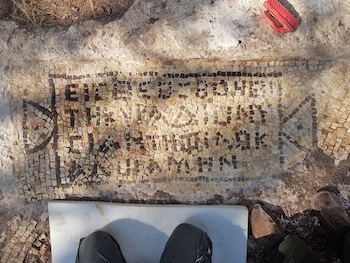An inscription (top of above photo and below), written in Greek, was translated by Prof. Leah Di Segni of the Hebrew University of Jerusalem. Dated to the early fifth century CE, it says, “Only God helps the beautiful property of Master Adios, amen.” (photos from IAA courtesy Ashernet)

New neighbourhood construction in the southern part of the Sharon Plain of central Israel has revealed an estate, some 1,600 years old, which was determined by Israel Antiquities Authority (IAA) archaeologists to have been the property of a wealthy Samaritan. The discovery reinforced evidence that, at one time, the area was extensively populated by the Samaritans, who claim they are Israelite descendants of the northern Israelite tribes of Ephraim and Manasseh. An inscription, written in Greek, was translated by Prof. Leah Di Segni of the Hebrew University of Jerusalem. Dated to the early fifth century CE, it says, “Only God helps the beautiful property of Master Adios, amen.” According to Dr. Hagit Torge, director of the excavation on behalf of the IAA, “The inscription was discovered in an impressive winepress [near the top of Tel Zur Natan, where remains of a Samaritan synagogue were found] that was apparently part of the agricultural estate of a wealthy individual named Adios. This is only the second such winepress discovered in Israel with a blessing inscription associated with the Samaritans. The first winepress was discovered a few years ago in Apollonia near Herzliya.” The Samaritans were originally brought to the region as part of Assyrian policy, and first settled on and around Mount Gerizim.

